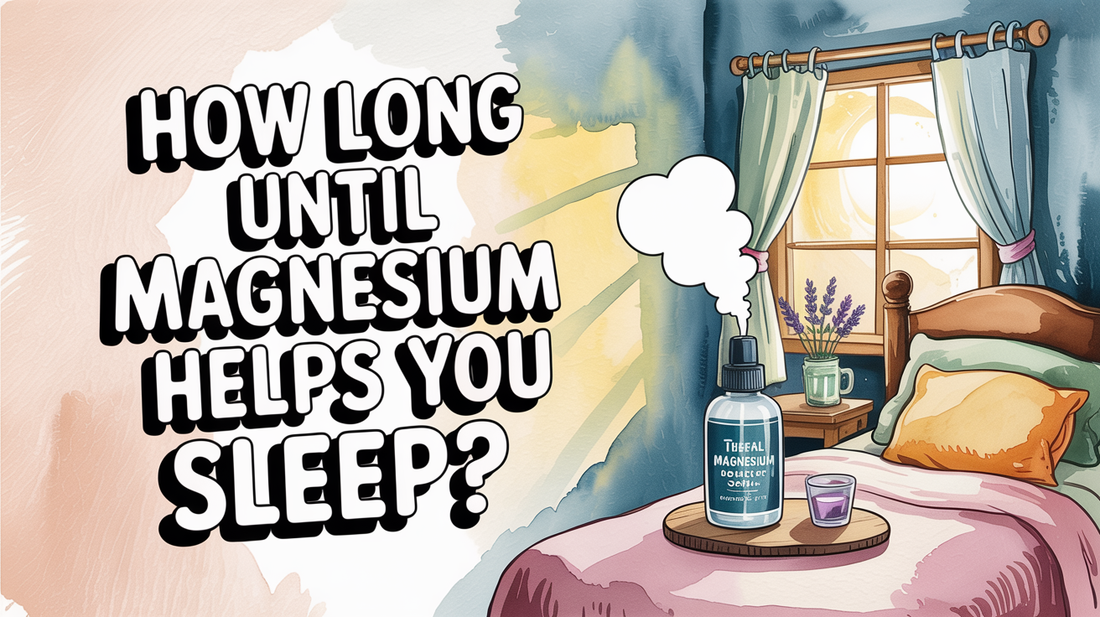How long does it take for magnesium to help you fall asleep?
Are you struggling to fall asleep at night? If so, you’re not alone. Many people seek natural solutions to improve their sleep quality, and magnesium may help. This blog post will explore magnesium sleep timing, how long magnesium works, and how magnesium for falling asleep can support your nighttime routine. We'll break it down into three sections based on current research, giving you practical steps to try tonight!
Relaxation may start within 30 minutes after topical application
When you apply magnesium topically, you might start feeling relaxed within just 30 minutes. This quick effect is due to magnesium being absorbed through the skin, which can help relax muscles and calm your nervous system more effectively than oral supplements. The transdermal absorption allows magnesium to quickly enter your bloodstream, bypassing digestive processes, which is beneficial for immediate relaxation.
Many people notice muscle relaxation as soon as 15-30 minutes after application. This is because magnesium aids in regulating calcium channels in your body. Additionally, it can support GABA neurotransmitter function, leading to initial calming effects on your nervous system. Individual absorption rates may vary, depending on skin condition and the concentration of magnesium used.
- Topical magnesium can provide quick relaxation effects, starting in as little as 30 minutes.
- Magnesium chloride and magnesium sulfate (Epsom salt) are often used in oils and lotions.
- Transdermal absorption leads to faster bioavailability than oral supplements.
- Muscle relaxation effects may be felt within 15-30 minutes.
- Calming effects can begin as magnesium supports GABA function.
Try It Tonight: Quick Start ✅
- Screen-free + dim lights for 10–15 minutes.
- Gentle stretch or slow breathing (4–7–8).
- Apply Magnesium Spray as directed (e.g., 4–8 sprays on legs/arms/shoulders 10–20 minutes before bed). Patch-test if new to topicals.
For deeper sleep quality improvements, consistent use over 1–2 weeks is often needed
While you may feel immediate relaxation from magnesium, noticeable improvements in sleep quality and duration typically require consistent use over 1 to 2 weeks. This duration allows your body to build up adequate magnesium levels and optimize its sleep-regulating processes. For those relying on oral magnesium supplements, it’s important to note that it can take time to restore cellular magnesium levels, especially for those who are sleep-deprived.
With ongoing use, you may experience enhancements in sleep architecture, including deeper REM and slow-wave sleep phases. Magnesium also plays a role in melatonin production and regulating your circadian rhythm, which necessitates consistent supplementation to see its full benefits. Studies indicate that measurable improvements in sleep quality can often be noted after 2 to 8 weeks of regular magnesium intake.
- Consistent magnesium use is key for long-term sleep quality improvements.
- Oral supplements may take time to restore magnesium levels in the body.
- Improvements in sleep architecture develop gradually with sustained use.
- Taking magnesium 1-2 hours before bedtime allows for optimal absorption.
- Expect to see measurable sleep quality improvements within 2-8 weeks.
Why We Recommend a Gentle Helper 🌿
Magnesium Spray is designed for quick absorption and a soothing, non-sticky feel with calming notes. It may support a consistent bedtime ritual.
- Quick-absorbing comfort—no heavy residue.
- Gentle feel designed to minimize tingling/itch.
- Clean-leaning and bedtime-friendly scent.
Diet, stress levels, and deficiency status all affect how quickly results show up 🔍
The speed and effectiveness of magnesium for sleep improvement can vary significantly based on individual factors such as current magnesium status, dietary habits, stress levels, and overall health. Individuals who are magnesium deficient may experience quicker and more noticeable improvements in sleep compared to those who already have adequate levels. Conversely, high stress can deplete magnesium stores, which might require higher doses or longer supplementation periods to see results.
Your diet also plays a crucial role; for instance, caffeine, alcohol, and processed foods can hinder magnesium absorption. Additionally, certain medications may reduce magnesium levels and slow down the effectiveness of supplementation. Factors like age, digestive health, and kidney function also influence how well your body absorbs and utilizes magnesium.
- Deficiency may lead to faster sleep improvements compared to adequate levels.
- High stress can deplete magnesium, potentially requiring more supplementation.
- Caffeine and alcohol can interfere with magnesium absorption.
- Some medications may lower magnesium levels and hinder results.
- Age and digestive health impact how well magnesium is utilized by the body.

